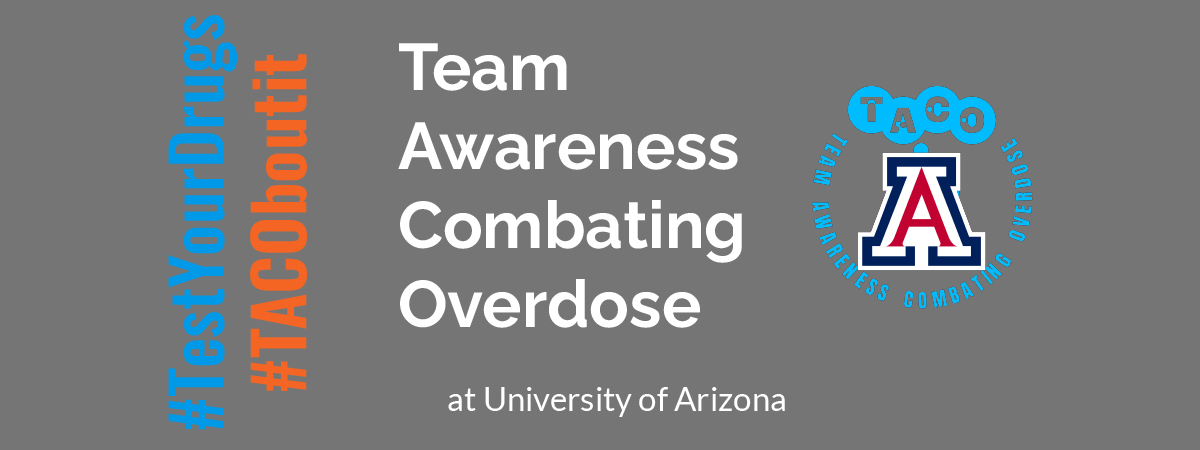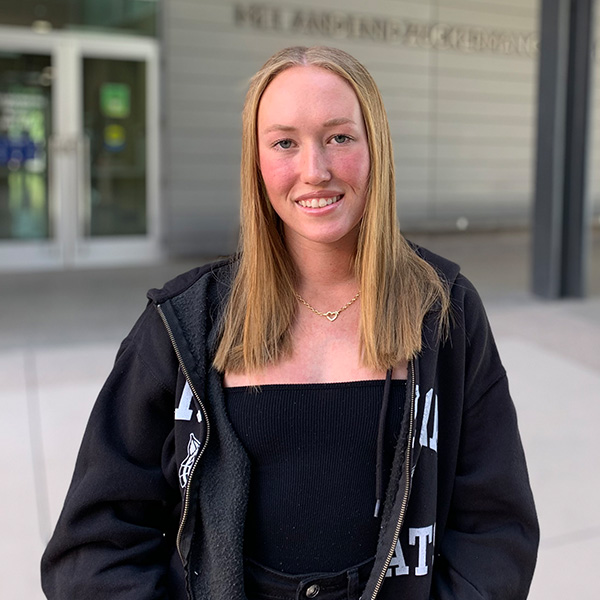UArizona Student Group Uses Public Health Approach to Combat Overdose Deaths

Public health undergraduate student Savannah Crowley works with the UArizona student group Team Awareness Combatting Overdose (TACO) that uses a ‘harm reduction’ approach to drug use education in their effort to stop overdose deaths.
In the United States today, accidental opioid overdoses rank as the number one cause of death for adults 18 to 45 years old. In 2021, more than a 100,000 Americans died from overdoses, and the number is expected to grow for 2022. Here in Arizona, more than five people die every day due to opioid overdoses according to the Arizona Department of Health Services. Students at the University of Arizona are determined to find ways to combat the overdose crisis and save lives.

Savannah Crowley
Savannah Crowley, an undergraduate public health student in the Zuckerman College of Public Health, is passionate about overdose prevention and substance use education for students. As the vice-president of the student group Team Awareness Combatting Overdose (TACO), Crowley helps provide non-judgmental drug education on campus and provide fentanyl testing strips to help keep students and young adults safe.
“It's all about doing good and keeping people both safe and healthy,” says Crowley, “My passion for harm reduction is the reason why I got involved with TACO. I had seen other approaches to the overdose epidemic, a public health emergency, fail friends and family many times.”
As a student-led drug education program, TACO uses a “harm reduction” approach advocated by public health professionals, a method that has consistently shown the most success when moderating behaviors like substance use. The harm reduction approach does not blame or shame individuals for their behavior, but instead seeks to educate and empower them to make choices that reduce the dangers of a particular activity.
TACO is now a national network of student-led groups, and the University of Arizona chapter of TACO was started in fall of 2022 by Madison Trotter, a neuroscience student. The student group was founded in 2020 at the University of Southern California (USC), and TACO has a good track record of success. Previously, USC had 10-12 fentanyl overdose deaths every year. Since the implementation of TACO and mandatory educational seminars for all new panhellenic and interfraternity members, there have been zero fentanyl related overdose deaths.
The students working with TACO provide neutral, scientific data to their peers, information that can be used to make well-informed decisions about personal drug use. The most dangerous drug in use today is fentanyl, and many other drugs are now contaminated with fentanyl. TACO’s drug education program is different from previous approaches that have had limited success. They do not give advice, only facts. And they do not approach drug use or addiction as a moral issue. In fact, they use the hashtag #endthestigma to emphasize that they seek to educate people, not tell them how to live. TACO students provide research-backed education, encourage drug testing, and provide test strips. They also provide overdose-response training. Their mission is to end overdoses so that young lives don’t end tragically.
“We distributed over 200 fentanyl test strips on campus last semester, encouraging students to test their drugs,” says Crowley, “this non-judgmental approach emphasizes the importance of utilizing harm reduction tools, and encourages more honest conversations about the facts of drug use. This way students can feel more comfortable reaching out for help if they need it.”
You can learn more about TACO by going to tacoinc.org, you can contact the UArizona chapter at taco.uofa@gmail.com, and you can follow them on Instagram @taco.uofa. We encourage our public health students to learn more about TACO and research-based drug education. In addition, MEZCOPH is working with Savannah Crawley to plan a TACO awareness event this spring to engage other public health students with the group, watch for the announcement.
MEZCOPH offers courses on the topics of addiction and substance use, including the current course Drugs and Society taught by Dr. Bridget Murphy. The college also offers an undergraduate Certificate in Addiction and Substance Use and an undergraduate Minor in Addiction and Substance Use, both developed by Dr. Ben Brady.

